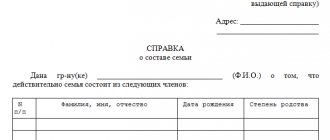Bookmarked: 0
What is an encumbrance? Description and definition of the concept.
An encumbrance is a restriction that arises on the basis of a concluded agreement or law and limits the ability to own, dispose or use certain property or property. Certain restrictions become relevant at the will of the owner himself, for example: pledge of property or property, while others are imposed regardless of the will of the owner, which may include seizure of property. So, in short, encumbrance can be defined as a restriction on the ability to use property.
Let's take a closer look at what encumbrance means.
The encumbrance significantly limits the freedom of action to carry out any manipulations with real estate, including use and, of course, conclusion of transactions.
Before starting the procedure for concluding a transaction, the potential buyer must urgently obtain comprehensive information about the encumbrances that may be present on the property or property being purchased.
In any case, the encumbrance is almost always closely connected with the property or property and, as a rule, usually does not disappear when it passes to the new owner. Therefore, if a buyer acquires a certain property, he acquires it along with all existing encumbrances, despite the fact that nothing may even be indicated about this in the transaction itself.
Encumbrances and their types
The current legislation stipulates the following types of encumbrances:
- the right to use real estate is established for a period of at least one year, this also includes gratuitous use, easements, rent, as well as lifelong maintenance;
- trust management. Established in case of guardianship or trusteeship, as well as in case of bankruptcy and in inheritance relations, etc.;
- arrest;
- pledge;
- restrictions imposed on the disposal, as well as the use of real estate or on the performance of any specific types
works Restrictions of this kind may be imposed by government agencies strictly within their competence; - transactions of a different nature that can encumber real estate, which are provided for by legislative bodies.
The restriction can be established on the following grounds:
- acts of state bodies, local governments;
- transactions carried out in relation to real estate;
- law;
- a court decision that has entered into legal force.
Registration of a small child in an apartment as an obstacle to its sale
The procedure for selling an apartment is very difficult if a young child is registered there. Legislation follows the path of maximum protection of the rights of the child, so many conditions must be met. This includes the consent of both parents, permission from social security authorities, and instant registration of a minor resident at a different address. Moreover, the living conditions cannot be worsened in any way, either in terms of area, amenities, etc.
Without compliance with the specified procedure, the apartment cannot be transferred under the contract.
Right to use real estate
If a certain person has a right to use the property, then that right encumbers it. The following list shows and briefly describes the rights that have the power to encumber real estate:
- Lease right . In the case where the process of concluding a transaction is taking place, and the property is located in the arena, then this in no way can affect the conclusion of the transaction, for example a transaction for the sale of property. With all this, in accordance with the current legislation, the transfer of ownership to another person to own property that is leased does not serve as a basis for termination or modification of a previously concluded lease agreement. Thus, the new owner of the property receives all obligations under the lease agreement concluded by the previous owner for the entire period of validity of the existing agreement.
- The right to free use or loan. As in the case of rent, the rights of the new owner are necessarily encumbered by the rights of the borrower (free user of the property) for the entire period. The consent of the borrower is not required to change the owner of the property.
- Lifetime maintenance with dependency - this right is one of the types of annuity, which is based on a contract, in which the recipient of the annuity transfers his real estate into the ownership of the one who is directly the payer of the annuity, and the latter, in turn, undertakes to provide lifelong maintenance with dependent on a certain citizen or any other specified person. For pledging, alienation or other encumbrance, the consent of the annuity recipient is required.
- Easement - this is the right of limited use of a plot of land that belongs to another person and is stipulated in the current legislation. Typically, an easement is established to ensure passage or passage through the territory of a neighboring plot, the operation or laying of power lines, pipelines and communication lines, as well as ensuring land reclamation and water supply, as well as in the case when any other human needs cannot be provided without its establishment . In this case, the owner of the property, be it a land plot or another type of real estate, has the full right to demand that the owner of the neighboring plot provide him with the right to use the neighboring one.
plot. Easements encumber structures, buildings and other property, the use of which is vital, regardless of the use of the land. - Seizure of real estate. In case of arrest, the person who owns the property is deprived of the right to dispose of the property, but retains ownership rights.
State registration of such agreements was canceled at one time in order to avoid duplication of all registration actions. In addition, such registration led to additional financial costs for both ordinary citizens and organizations. In this context, it is worth mentioning the following figures: persons who applied for registration actions had to pay a state fee in the amount of 1,000 rubles for citizens and 15,000 rubles for organizations. Moreover, the fee was paid twice - both for the registration of the contract itself, and directly for the registration of the encumbrance.
So, encumbrance is a set of legal actions that are aimed at restricting the rights of owners in the interests of third parties.
Thus, some encumbrances are transferred to another right holder, in the case of an easement, while others can be terminated by the decision of one or more competent persons, in the case of a lease or seizure.
Possible difficulties
But not everything goes well: when buying apartments with encumbrances, you can encounter great difficulties. For example, before signing a contract, a buyer deposits money to buy an apartment in a safe deposit box, the bank checks it and allows the encumbrance to be removed. The apartment is released from the mortgage, and after that the seller refuses the deal. In such a situation, the buyer will have to, through the court, oblige the owner of the apartment to reimburse the costs of the failed transaction. Drawing up a preliminary deposit agreement will help to avoid such a situation.
At first glance, a rental agreement is a profitable option for those who dream of getting their own home. But rent also has many pitfalls. A sudden announcement of heirs can change the plans of the annuity payer, so before concluding a lifelong maintenance agreement, you need to make sure that there are no other claimants to the owner’s property. And even in this case, there are no guarantees that the owner of the property will not terminate the contract. The mood of older people is changeable; after the most harmless quarrel or the suggestion of neighbors, a dependent pensioner goes to court to terminate the annuity contract. And the court usually takes the side of the elderly person. Therefore, when signing such an agreement in the presence of a notary, it would not be superfluous to include a certificate from a psychiatrist stating that your ward is not registered with such a person and quite consciously decides on lifelong maintenance.
Another situation: the apartment has been sold and documents for all debt obligations to the bank have been drawn up, but the former owner does not move out of someone else’s property. And in this case, only going to court with a demand to evict the seller of the apartment and recognize the former owner as having lost the right to use. Such lawsuits can drag on for years.
Auctions for the sale of mortgaged real estate are organized by the bodies that carry out the execution of court decisions and are held at the location of the property. Information about auctions appears 10 - 30 days before the start. All interested participants make a deposit (no more than 5% of the initial cost of the mortgaged property). The winner of the public auction is the participant who offered the highest amount. Within five days after the purchase price is paid, an apartment purchase and sale agreement is concluded. This agreement and the protocol on the results of the auction are the basis for registration in the Unified State Register.
The form of auction differs from public auction in that the initial price of the object of sale is set based on expert assessments. Information about the auction is published in periodicals (on the official resources of the executive branch 6 - 13 days before the set date of the auction). Participants also make a deposit of up to 5% of the starting price. The winner is the participant who offered the maximum amount. The winner and the organizer sign a protocol on the results of the auction. After the full amount has been paid, a purchase and sale agreement is concluded with registration of ownership.
Trust management
The owner has the right to transfer real estate to the so-called trust management. Such a transfer of property does not entail the transfer of rights to ownership of the same property to a trustee, who now undertakes to regularly manage the property in the interests of the copyright holder or any other person designated by the copyright holder.
Rights to real estate that are related to its disposal on trust are registered exclusively and only on the basis of documents that in turn determine the attitude of the owner or other managing person, including those based on the relevant decision of the court or simply a concluded agreement.
An onerous agreement for trust management of real estate is concluded only in writing as an onerous document. Trust management, as well as the transfer of real estate, is subject to mandatory state registration in the same manner as in the case of transfer of the right to own property.
Failure to comply with certain forms of the agreement that is drawn up for subsequent trust management makes it completely invalid.
Lease restrictions
According to the lease agreement, the landlord agrees to give certain property for temporary use to the tenant or tenant. Land
plots, except those that have been withdrawn from circulation, are leased in accordance with the current Land Code and civil legislation of the Russian Federation.
An onerous agreement must be concluded only in writing and must have the signatures of both parties to the transaction. Failure to comply with the form of the concluded agreement completely deprives it of legal force. It is worth mentioning that one of the parties can apply for registration; in other words, only one application from the same, for example, tenant, is quite sufficient.
When leasing a land plot or part of it, a cadastral plan of the entire plot indicating the part that was directly leased is attached to the encumbrance agreement. However, with the delivery of structures, buildings or some part of the premises, the situation is a little more complicated. In this case, a floor plan of the entire building or structure must be attached to the contract, on which the territory intended for rent must be indicated, and its entire area must also be indicated.
Restriction in the form of collateral
A pledge is an encumbrance that arises when concluding a pledge agreement and that secures the fulfillment of a primary obligation, such as a loan of a specific amount of money. By virtue of a pledge, the pledgee can repay the debt from the value of the property that was pledged, primarily to the creditors of the pledgor. If the ownership of the previously pledged property has passed from the mortgagor to some other person, then the right of pledge in any case retains its legal and enforceable force. It should also be noted that this encumbrance makes it possible to transfer ownership only with the consent of the mortgagee.
Features of lifting bans
In terms of time, the removal of the encumbrance by the registering authority is carried out within 3-5 working days. The countdown begins from the day you submit a complete package of documents either to the Rosreestr branch or to the MFC. When applying through the MFC, the duration of changing data in the database may take up to 10 days.
The encumbrance can be removed if you have the necessary documents
The applicant is required to provide the following set of documents:
- Title document for real estate.
- Mortgage from the bank.
- Certificate from the creditor stating that the contract has been fulfilled and there are no debts or claims.
- Application for removal of encumbrance.
- Passport of the applicant.
- Receipt for payment of state duty.
Situations that provide grounds for lifting restrictions:
- Obligations were fulfilled before the expiration of the established period.
- There is a annulling court decision that has entered into force.
- All interested parties (owner, encumbrancer and others) reached a consensus and entered into a settlement agreement.
- Obligations were fulfilled by all counterparties on time and as required by the contract.
In addition to the applicant, the appearance of other participants in legal relations or their representatives is required at the Rosreestr unit. At the same time, they write statements in which they indicate that the transaction, if any, took place and the parties do not have unfulfilled obligations.
Seizure on property
Another fairly common type of encumbrance on property is seizure. An arrest implies a ban on making any transactions. Arrest is imposed exclusively by a bailiff, court, preliminary investigation or inquiry body. No transactions can be made with property that has been seized until the seizure is lifted. The owner of property on which an encumbrance has been imposed in the form of an arrest or which has been handed over to him for storage, is obliged, in turn, to ensure its complete safety throughout the entire time that the encumbrance of the arrest is in effect.
Encumbrance on a share
In some cases, the owner owns a share in a particular property; this share may be under an encumbrance on the property, for example, it may be arrested, mortgaged, rented, transferred under trust management, etc.
Thus, with the direct imposition of any existing type of encumbrance on property
or his share in the right of ownership is not possible to alienate the entire property by prior agreement between all co-owners. At the same time, pledge, arrest or other encumbrances on property do not prevent owners of common property from disposing of it. For example, property can be donated, sold or exchanged. An encumbrance existing at that time that applies to a share of the property deprives the co-owners of the right to divide it by agreement between them, since such a division also applies to the share of the property on which the encumbrance has already been imposed.
We briefly examined what an encumbrance is, its meaning from the point of view of owners of a certain type of property, as well as various types of encumbrances imposed on property, in accordance with established current legislation. Leave your comments or additions to the material.
Tips from the experts
If you don’t know how to find out all the information about the living space you like and not fall into a trap, use the advice of experts:
- For any real estate transaction, order an extract from the Unified State Register. It will reflect all encumbrances and restrictions as of the date the request was created.
- If the property is sold immediately after the owner assumes inheritance rights, it is better to wait additional time and buy living space without the risk of encountering “late” heirs.
- When purchasing shared ownership, require the seller to provide a document confirming the refusal of the remaining owners of the right of pre-emptive acquisition. This will help subsequently avoid problems such as seizure of real estate (only a court can impose such a restriction).




